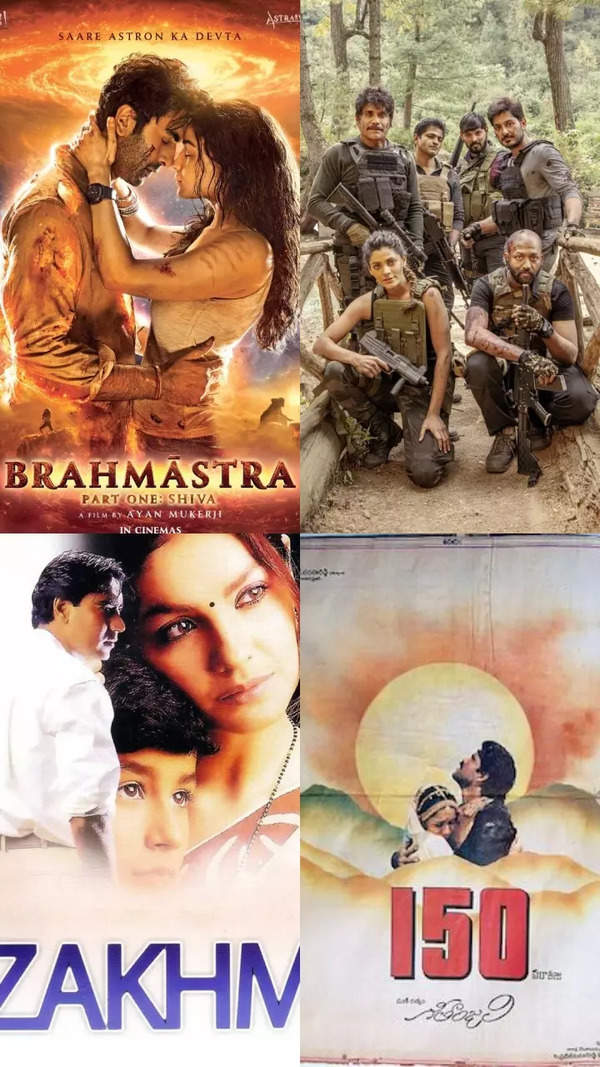- News
- entertainment
- telugu
- movies
- Akkineni Nageswara Rao interview
Trending
This story is from April 5, 2013
Akkineni Nageswara Rao interview
A chat with the legendary Akkineni Nageswara Rao is like taking a lovely black-and-white journey down the memory lane, to a magical era when films, actors and life in general, was simple, sweet and beautiful. Excerpts from an interview, where the original romantic hero of Telugu cinema, gets candid as he shares with us some untold tales from Tollywood


born to a poor farmer in Ramapuram, Krishna district, in 1924, he studied only up to class 5 since his family couldn���t afford to send him to school after that. ���I had to go to all the way to Gudivada to attend school, and that���s something my parents couldn���t afford. So, I dropped out and stayed back at home to help my mother in cleaning house and running errands. Even back then, I had an interest in local theatre and singing. my mother was the one who spotted the fire in me first. She asked my brother to get me into a local theatre group since I loved natakalu (drama).
That was my first tryst with the stage. Interestingly, since I was a young boy, all my initial roles have been that of female characters,��� reminisces the thespian, laughing nostalgically. Till the age of 17, Nageswara Rao used to play only female characters.
Luck by Chance
The story on ANR���s entry into the world of cinema is as filmy as it can get. ���One day, I was at a railway station with my drama troupe and to my good luck, Ghantasala Balaramayya garu (producer-director) spotted me standing nearby. He walked up to me and asked me if I want to work in films. I didn���t think twice and just went along with him.��� The rest as they say is history. ���To me, Balaramayya is more important than God. If he hadn���t spotted me that day, I wouldn���t have been where I am today.��� Though that might sound like a dream entry, ANR says it was far from easy.
���I was a village bumpkin who didn���t know even the basics, like greeting someone or speaking confidently in public. In fact, my friends and family were worried about how I would manage to survive in the film industry, considering I wasn���t even highly educated.��� not only did he survive, but also went on to become on of the most celebrated romantic heroes of all time in Telugu cinema.
From Krishna Jilla to Michigan
To make up for the lack of formal education, this village boy from Ramapuram decided to make of use every opportunity that came his way to improve himself on all fronts. ���films were my classrooms, my roles were my teachers,��� he says. One of his fondest memories to date is the day he managed to surprise everybody by delivering a talk at the Michigan University in USA, when he toured the country in 1964. ���That too, in English...,��� he quips. ANR swells with pride when he talks about that instance, even after so many years.
���Those were the days when Jawaharlal Nehru was our prime minister and cultural exchange programmes between us and other nations were a common thing. The US government had extended an invitation to me in 1964 as I was from the field of arts and cinema. The previous year, Tamil superstar and my good friend, Sivaji Ganeshan, was invited. Since he wasn���t too sure of his English, he took an interpreter along. When my turn came, I was nervous. But I decided I won���t use an interpreter.
I looked at this as an opportunity to learn English. i spent much of my time in the US watching the locals and other delegates who were conversing in English. I tried to grasp what they were saying,��� says Nageswara Rao. ���After St Louis, our team was taken to visit Michigan University, where I was asked to deliver a talk on culture and films. All my friends were worried for me as they knew I couldn���t speak English. But I walked up on stage confidently and before I began my speech, I confessed that I am not so highly educated and neither did I speak English well.
I asked them to bear with my grammatical errors. After I ended the speech to a thunderous applause, I got off stage only to see my friends spell-bound. By the time I returned to India I was able to hold a decent conversation in English,��� says Akkineni, who believed that with determination you can master anything.
Eager for a ���break���
While everyone else waits for their first big break in films, ANR was waiting for a break of another kind ��� a break in his voice. Laughing heartily at the very thought of what he calls ���an awkward phase in life���, ANR says, ���Blame it on the many female roles I played during the early years of my life, but fact is that my voice just refused to break even though I had become a lead actor. In fact, in my first few films like Seetharama Jananam, Maya Lokam, Mugguru Marateelu, I also doubled up as the playback singer ��� that���s how melodious my voice was. (laughs).��� But matters took an embarrassing turn when he began to sound similar to his leading ladies. ���Yes, it was awkward. In Seetharama Jananam where I played Lord Rama, my voice was just like Seetha���s.
That made me very shy, it was embarrassing,��� says ANR. Eager to sound like any macho hero should, ANR then approached music directors Prabhala Satyanarayana and Ogirala Ramachandra Rao with his peculiar problem. ���i told them that I am worried as my voice didn���t break. So, they gave me some useful advise, which actually worked.��� And what was it? ���They asked me to place a large earthen pot full of water on a heap of sand, and leave it overnight till it became very cold. At that time ice was hard to come by, so this was the way to cool water.
At the crack of dawn, I had to wake up, hug this pot and go ���aaaaahhh���. This crazy exercise had to be done for an hour everyday. And I used to practise this religiously for a few months. Soon, I outgrew my sweet voice and sounded man enough,��� says ANR, with a chuckle. ���Those were the days.���
a hit pair is born
With a new-found voice, and confidence, ANR soon told his directors to look for a playback singer, as he would no longer sing. And in came Ghantasala, who not only went on to become the voice of ANR melodies, but also one of the greatest singers Telugu cinema has seen. Anyone familiar with the ANR brand of romance will know that Ghantasala had become synonymous with the former���s films. Most of ANR���s films were musical hits and Ghantasala sang his songs. The veteran actor admits that the singer had a huge role to play in his success.
���The funny part is that initially the whole film industry had apprehensions about accepting Ghantasala���s voice. but later, it got to a stage where they couldn���t do without him. When I first heard his songs, I asked Balaramayya garu to pick Ghantasala as a playback singer for me, since I wouldn���t sing anymore. So, since Balaraju he remained my playback singer for many years. And he also became a part of my career���s success ���we were such a hit pair,��� says ANR. Surprisingly, Ghantasala was known to ANR before both entered films. ���But I never expected that one day he will sing for me and play such a huge part in my career,��� says the actor.
A path-breaking actor
Though he started off with fantasy films and movies based on folklore, his reign over that genre lasted only until N T Rama Rao entered the picture. Around the same time, Vedantam Raghavayya came up with the idea to make Devadasu, based on the Bengali novel Devdas. He approached ANR, who jumped at the offer, as he looked at it as a chance to do something new. ���Back then, many people criticised me for taking it up. They said I wasn���t suited to star in a romantic saga, since ���folklore��� and ���fantasy��� was my genre. People even advised the producer against casting me, saying I just wouldn���t fit the bill. Criticism made me all the more determined to prove myself,��� says ANR, as he looks back at the film that not just went on to become a classic, but also marked the birth of one of Tollywood���s first romantic heroes.
Calling it a film where he put in the maximum effort, ANR says, ���When people saw me on screen in Devadasu, they assumed that I starved myself to look like the heartbroken, alcoholic that I played on screen. Truth is far from it. I was actually healthy with robust looks. After watching myself I realised that no matter how hard i tried, I didn���t look like a drunkard because my eyes were clear. So, I requested the director to shift the shooting schedule to the night. I used to stuff myself with heavy dinner and then shoot overnight... even as my eyes were dropping, heavy with sleep.
The effect was excellent and that���s how I pulled Devadasu off.��� In fact, it was pulled off so well, that fans actually wrote to him, concerned that he had actually taken to alcohol. ���I got many letters which read, ���Babu, you have a long career ahead... Don���t drink too much...������ he guffaws.
Though Devadasu helped him make a mark in the genre of romance, he didn���t want to repeat the drunk act again. ���The industry was always quick to typecast you. After Devadasu became a hit, several people approached me to do similar roles with two-three drunk scenes in the films. I refused all of them because I wanted to break the mould,��� says the thespian, who is known for the variety he brought into his repertoire of roles. And his credits his success to this exercise of choosing carefully and analysing himself at every step of the way.
Cinema���s first Dancing hero
Interestingly, Nageswara Rao happens to be the first male actor in Indian cinema to have danced in films. ���This is something not many know or remember, but back in the day heroes would not be caught dead dancing. That was the heroine���s territory. But truth is that when music played, I couldn���t stop myself from breaking into a dance. So, I added a few dance movements to my song sequences, and they were appreciated by the local audience.��� However, this move, earned him a lot of criticism from the biggest stalwarts of Indian cinema. ���Everyone from Raj Kapoor to Sunil Dutt, and many others, criticized my dance and called me pansy. They said dancing should be left to the heroines,��� says ANR. ���Later, our cinema came to be known for its song and dance. In fact, today there is a overdose of it.���
changing times
Commenting on the evolution of cinema since his time, ANR says, ���Those days producers drove the films. They were like psychologists, who knew the pulse of the society and the audience. They didn���t bother about the technical aspects. Also, they got the story ready first and then thought about the artiste to suit the characters.��� Admitting that he���s from the very same industry and so it���s tough to criticise, ANR adds, ���Today, it���s the other way round. producers have become proposal makers. Filmmaking is more about selling skin show. technology dominates, not story.���
hope for the future
���Now and then, I watch my son Nagarjuna���s films and see that some of the stuff is vulgar. I have even asked Nagarjuna about it. He told me once, ���Dad, you don���t know modern films. In fact, you don���t even know what���s happening in other films these days, they show worse things. I am better off. I have to do these things if I have to be in the business and fight competition.��� I realised then that things have truly changed since my time,��� he says.
On a positive note, he adds that he is confident that the film industry will come back to its days of glory again. ���Our films will go back to the good old days. I may not be around to see the change, but the young generation will enjoy the difference,��� he says, as he signs off.
End of Article
FOLLOW US ON SOCIAL MEDIA







